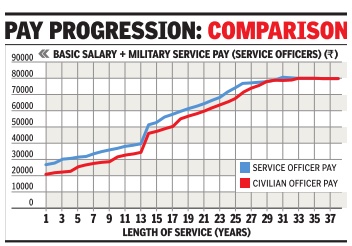Defence services, India: personnel issues
This is a collection of articles archived for the excellence of their content.
|
AWOL: SC judgement
The Times of India, October 29, 2015
He who goes AWOL can't be good soldier
A rmy personnel who go on unauthorised leave can never be A good soldiers and there is nothing wrong in discharging such persons from force without issuing show cause notice, the Supreme Court said on Wednesday. A bench of Justices A R Dave and A K Goel upheld the government decision to discharge army man Manoj Deswal who went on leave without taking permission from his commanding officer. The SC said no special notice is required to be given before discharge of a person if he is accused of such indiscipline.
Civilians’ emoluments vis-à-vis defence personnel
2004 onwards: Defence personnel paid considerably higher than civilians
The Times of India, November 23, 2015
Pradeep Thakur
Post-2004, salary gap continues to widen: Panel analysis
Defence personnel get higher pay than civilian counterparts
Officers of the three defence services -Army, IAF and Navy -are paid 29% higher salary compared to their civilian counterparts from the IAS, IPS and other Group A services at the starting level, the seventh pay panel has said. For post-2004 recruits, this pay differential has increased to 43% in favour of defence officers as civil servants who joined thereafter have to contribute towards pension benefits. This gap continues to remain wide at over 20% in favour of defence officers for the first nine years of service and remains uninterruptedly higher for 32 years.
“It does not take into account allowances, which are intended to compensate for specific hardships and risks that (defence) officers face in the discharge of their duties,“ the pay panel noted while doing a comparative analysis of salaries of defence officials with civil servants.
The analysis of pay does not account for other benefits in cash and kind admissible to defence officers such as free rations, tax concession for canteen, travel in railways and by air and free electricity up to 100 units each month.
The comparison was drawn after the three defence services in their joint memorandum urged the panel to maintain their edge in pay over civil servants. In its report submitted to the government on Thursday , the pay panel observed that after the sixth pay commission award, “the pay of defence service officers remains un interruptedly higher for a 32year period. Thereafter, pay of defence and civil service officers are at par“.
“The edge in initial pay for defence service officers, which was 7% post-third CPC, fell marginally to 4% and 3% in the fourth and fifth CPC respectively, has postsixth CPC increased sharply to 29%,“ the report said.
The commission, however, justified the pay edge and said, “Defence forces personnel are trained for war-like situations with highly sophisticated war machinery . They have to keep themselves posted in modern warfare. The military institutions are a key symbol of national pride.“
Further, a study commissioned by the seventh pay panel showed that salaries of defence officers and JCO ORs in India, based on sixth CPC pay scales, compared favourably with that of defence personnel in countries like the US and the UK, where the GDP per capita in purchasing power parity (PPP) terms is significantly higher than that of India -9.4 times in the case of the US and 6.7 times in the case of the UK.
The pay panel clarified that these conclusions were equally applicable to civilian employees who were similarly placed. The Institute of Defence Studies and Analyses carried out the study comparing the salary structure of personnel in the Indian defence forces with that of UK and US on PPP basis.
Veterans to move apex court against OROP notification
The United Front of Ex-servicemen on Sunday declared that it will move the Supreme Court against the central government's “flawed“ notification for One Rank One Pension (OROP). Major General (retd) Satbir Singh, who is advisor to the front, said in Chandigarh that the veterans will move the SC within 10 days through noted lawyer Ram Jethmalani. Singh, who was on his way to Sirhind in Punjab to address an ex-servicemen's rally, reiterated that the veterans' agitation was not for money but for upholding the honour and dignity of the forces. The government's refusal to further discuss the anomalies in the OROP notification had downgraded the honour and dignity of the forces, he alleged. “An initial study of the recommendations of the 7th Pay Commission indicates a further downgrading of that status,“ he said. He said the IAS lobby was working against the interests of the armed forces. TNN
